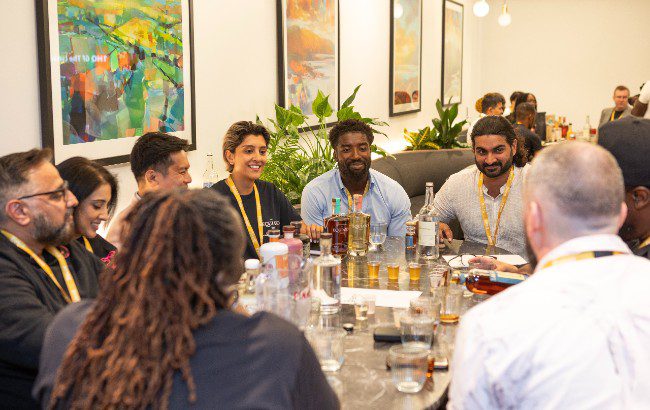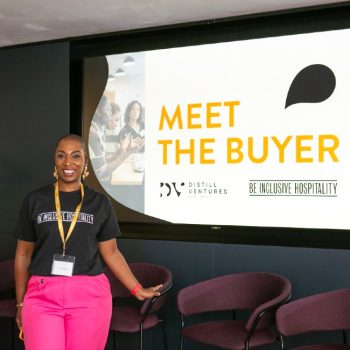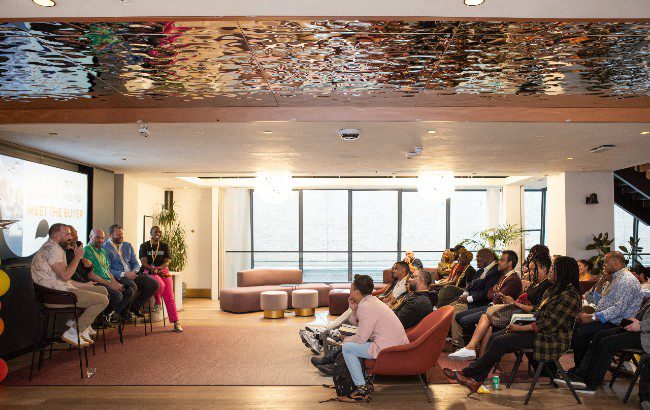Meet the Buyer event works towards inclusive supply chain
The inaugural Meet the Buyer event connected ethnically diverse founders with key distributors to openly discuss challenges and trends in securing listings.

At the inaugural Meet the Buyer event, hosted by Be Inclusive Hospitality and Distill Ventures, brands and buyers benefitted from a speed-dating-style system of panel discussions. Challenges, trends, and tips were shared throughout the day, including the struggles felt by smaller brands to secure distribution deals, plus stock and consistency challenges facing buyers.
It is estimated that minority businesses contribute between £25 billion (US$31.9bn) and £74bn (US$94.4bn) annually to the UK economy, according to the Social Market Foundation.
The event aimed to support the development of an inclusive supply chain environment within the on-trade channel. It brought together ethnically diverse drinks founders and key decision-makers from UK distributors, restaurants, bars and hotels.
Each buyer and brand (comprising 12 buyers and 20 brands) took part in four 35-minute roundtable discussions. The brand founders presented themselves and their product, before asking a question to the buyers sat opposite – on any topic of their choosing.
Helping brands secure distribution
The Kromanti rum team, represented by founder David Cashain, raised the difficulties the brand has faced in communicating with key distributors, notably Matthew Clark. He was not alone in this experience on his panel. The discussion surfaced from talks with national hotel group Leonardo Hotels, whose nationwide policy is to stock its beverages through Matthew Clark. However, Kromanti noted it was “finding it hard to get into the ‘extended arm’ of Matthew Clark”. “We need help being connected and ushered in,” Cashain said.
Suzanne Palm, director of food and beverage at Leonardo Hotels, responded positively, agreeing there are areas where communication could be improved.

“I think there’s an opportunity to open conversations more between us as a hotel and our distributor, and to let them know more what products we are seeing that we’d like to stock,” Palm said.
Jacine Rutasikwa, co-founder of Matugga Rum, asked what brands can do to support bars that stock their products, or to secure a listing at the bar.
Sly Augustin, founder of London’s Trailer Happiness bar, said: “If you can build a small community, people who enjoy your product, this can make our job easier and we can incorporate that into our efforts.
“We need to give people added value because otherwise they will stay home. What’s the reason for coming to my establishment? It’s because I’ve got products that aren’t in their local corner shop. We need brands that really understand who they are, who their audience is, and who are also willing to work with us to grow that community.”
How to support culturally diverse products
After presenting the brand, one of Crazy Gin’s co-founders, Paramjit Nagra, posed the following question to a trio of buyers: “What is your criteria to evaluate culturally diverse products?”
Samantha Burke, managing director of Love Drinks, answered: “What is your product doing differently? When my sales team goes into a bar, what product can they take off the shelf to replace with yours?”
For Stephen Grabaskey, senior buyer at Enotria & Coe, it was about authenticity. “Provenance and quality are crucial standout things as well,” he added.
While for Ciaran McNicholas, founder of Tortuga Logistics, and Nightcap Brands, “people, product and liquid” were the key deciding factors.
“We are always looking for something a bit different, something that is going to spark open conversations in our portfolio,” McNicholas continued. “Something unseen before is very good for us. It creates a point of relevance to consumers.”
A panel discussion concluded the roundtables, moderated by Lorraine Copes, founder of Be Inclusive Hospitality.
A key piece of advice offered to newer brands when establishing themselves on the market was to “slow down”, as recommended by Andy Newcombe of distributor Neat Spirits.

Adam McGurk, drinks development manager for all Stonegate Be At One sites, noted how it was important for brands to track trends in drinking habits. He offered the example of how people are drinking at different times post-pandemic, compared with pre-2020.
“There’s been a shift in time frames; more alcohol is sold between 2pm and 8pm, whereas before it was much later,” McGurk said. “Most people are drinking completely differently, so we’re seeing a decline in late-night consumption.” The Night Time Industries Association revealed that 35% of independent nightclubs in the UK closed between March 2020 and December 2023.
Furthermore, he advised brands to be “discreet in the right moments”, after noting many will share listings they have already secured in a bid to impress, unaware they are all competitors for the current listing they are trying to secure. This goes against the previous notes made about wanting to find brands with points of difference, or those not widely available.
Copes said: “This event was such an important stepping stone for the UK on-trade, as there currently is not a similar space that allows ethnically diverse drinks founders to connect with decision-makers.
“Our industry is built on relationships and great products, and we have an abundance of this in the room, with new relationships forged.
“We work with many forward-thinking operators, some of whom were in the room, and I am excited to build this community further to realise my ambition of an inclusive supply chain.”
Related news
Alexandra Tsatsouli wins Bartenders Society 2025 competition
